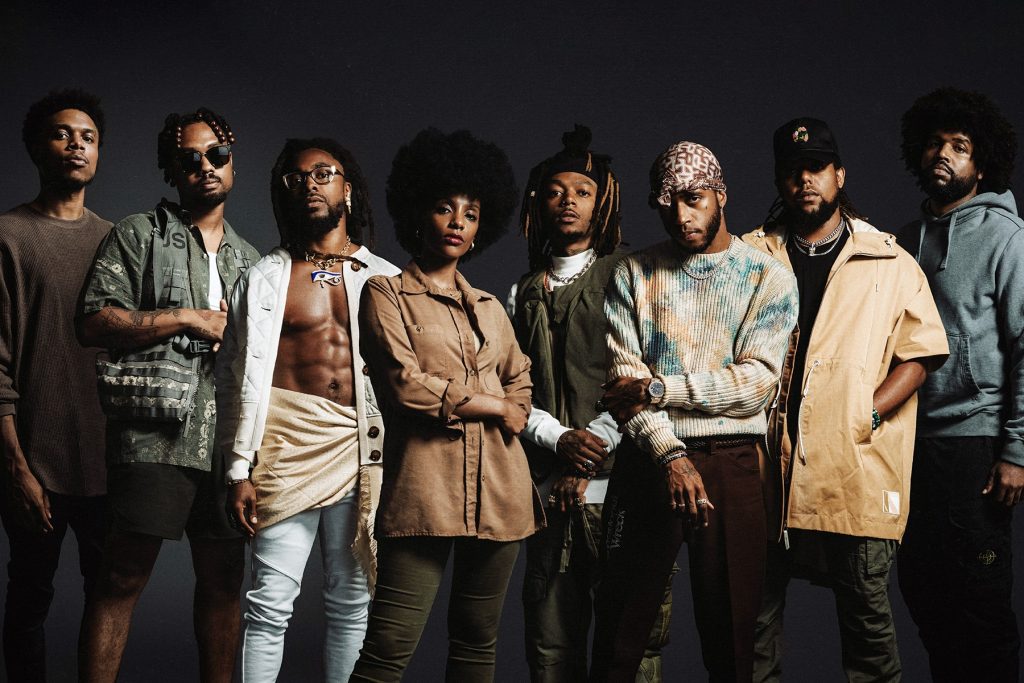
How Spillage Village Hunkered Down in Atlanta and Captured the Chaos of 2020
Many people have found themselves back in their hometowns this year, grappling with a rapidly changing, unpredictable world from environs they’ve known all their lives. For Spillage Village — the musical collective consisting of chameleonic duo Earthgang; nimble rhymer J.I.D; soulful singer Mereba; producers Hollywood JB and Benji; charismatic rapper Jurdan Bryant; and alt-R&B superstar 6lack — that meant heading to Atlanta, where the group formed and most of its members are from.
J.I.D had rented a house in the city to record his third solo album; he planned on making it a revolving-door situation, where friends and collaborators could show up and work on music in a more comfortable setting than a sterile studio space. Many of the Spillage Village members were expected to come through for short stints, but as the coronavirus pandemic scuttled tour and festival dates and people began looking for safe places to be stationary, J.I.D realized that there might be a new opportunity.
blogherads.adq.push(function () {
blogherads
.defineSlot( ‘medrec’, ‘gpt-dsk-tab-article-inbody1-uid0’ )
.setTargeting( ‘pos’, [“mid-article”,”mid”,”in-article1″,”mid-article1″] )
.setSubAdUnitPath(“music//article//inbody1”)
.addSize([[300,250],[620,350],[2,2],[3,3],[2,4],[4,2]])
;
});
“We always did that communal thing,” he says of Spillage Village, which began when he and the two members of Earthgang (Olu, a.k.a. Johnny Venus, and WowGr8, a.k.a. Doctur Dot) got close after attending Hampton University, and has since grown considerably. “In this case, I was like, ‘We might as well do it since nobody’s doing anything.’”
What they created is Spilligion, an album filled equally with uplifting, soulful melodies and contemplative bars about day-to-day reality in 2020. It comes as close as any album made in quarantine to capturing the messiness of this chaotic, bleak year. With just a few features from the likes of Ari Lennox, Chance the Rapper, and Big Rube, Spilligion sounds like what you might imagine happens when seven distinct voices share a space and lean on one another to process the events of an uncertain world.
The group began with five members before Mereba and 6lack, a former roommate of Earthgang, joined in 2014. The latest addition is Benji, who added an extra musical dimension with his prodigious bass skills. Benji’s brother Christo isn’t technically a member of Spillage Village, but he’s the go-to beatmaker for Earthgang and J.I.D and produced much of Spilligion while living with the group.
At first, the sessions in the West Atlanta house, which was built by a music producer with just this sort of project in mind, weren’t all that different from how J.I.D had originally envisioned them. The artists, their teams, and other musicians and friends would come and go. Each group member got their own bedroom, and more often than not their own makeshift recording space apart from the big communal ones that were already part of the home’s design. 6lack was stuck in Los Angeles, but participated remotely, eventually flying out towards the end of the sessions; Mereba was there at the start, but returned to L.A. after a few weeks. Everyone else stayed for more than two months.
This approach is similar to how Dreamville — the J. Cole-affiliated collective whose members overlap with Spillage Village’s — worked in their well-documented sessions for last year’s Revenge of the Dreamers III, also held in Atlanta under less frightening circumstances. “We’re not really studio people, we’re house people,” says group manager Barry Johnson.
When Georgia issued stay-at-home orders in early April, lockdown became a necessity, and the artists cut off the open-door policy. Suddenly, the seven remaining musicians found themselves alone, more or less the way they began making music as unknowns in the vibrant Atlanta underground scene of the early 2010s. According to Bryant, that isolation forced them to be resourceful, just like old times: “It actually made us have to come together. Instead of getting people to come in and add different things, it was just us creating.”
blogherads.adq.push(function () {
blogherads
.defineSlot( ‘medrec’, ‘gpt-dsk-tab-article-inbody2-uid1’ )
.setTargeting( ‘pos’, [“mid-article2″,”mid”,”in-article2″,”mid-article”] )
.setSubAdUnitPath(“music//article//inbody2”)
.addSize([[300,250],[300,251],[620,350],[2,4],[4,2]])
;
});
Eventually, a workflow started to take shape. According to several members of the group, early records like “Psalm Sing” — a kind of neo-praise song with one of Benji’s choice basslines — helped not just get the gears turning, but establish the wide-ranging creative parameters that later birthed records like the six-minute piano odyssey “Hapi” (featuring one of several choice Big Rube cameos) and the mesmerizing Earthgang showcase “Shiva.” Production was largely handled in-house by Christo, Benji, Hollywood JB, and Olu, with the others providing notes and input.
At the house, there wasn’t the ticking-clock feeling that comes with rented studio time. They could spend just as long nurturing the emotional bonds that made them good collaborators as they did actually recording music. “In the Revenge of the Dreamers sessions, there was a little downtime, but most of it was with the goal of making music in mind,” Olu explains. “Some days when we were working on Spilligion, there were days where we would just have a bonfire, sit outside, and make s’mores. Some days we would play Monopoly or Trouble all night.”
Nearly every group member mentions those board-game nights, unprompted, with varying commentary. “We played Monopoly religiously, and it was bad,” Christo says with a laugh. J.I.D and WowGr8 seem to relish the competition — J.I.D refers to playing Monopoly as “[expanding] our fiscal palette” — but both of them want to set the record straight on those high-stakes battles.
“Everybody was scared of Monopoly, though,” J.I.D says emphatically. “Let that be known. [WowGr8] was on point with the Monopoly, but everybody else — I don’t wanna hear it. JB hates Monopoly. Jurdan Bryant hates Monopoly. Olu hates Monopoly. Make that known, too.”
“They’re all some communists, too,” WowGr8 adds with a snicker.
Throughout their time in quarantine, Spillage Village’s members toed the line between wellness and excess, just like so many others this year. Olu purchased everyone in the house a yoga mat, and led a range of different workouts. “Some of them threw up the first day, drenched in sweat, but they came back the next day and were like, ‘I love this,’” he says.
Smoking was essential to both the creative process and simply getting through the day’s news. “We started rolling up, and after that I felt like the sky was the limit,” Hollywood JB says. For further inspiration, they had long conversations around the bonfire and watched documentaries. (The Michael Jordan doc series The Last Dance was appointment viewing each Sunday as it was airing.)
blogherads.adq.push(function () {
blogherads
.defineSlot( ‘medrec’, ‘gpt-dsk-tab-inbodyX-uid2’ )
.setTargeting( ‘pos’, [“mid”,”mid-articleX”,”in-articleX”,”mid-article”] )
.setSubAdUnitPath(“music//article//inbodyX”)
.addSize([[300,250],[300,251],[3,3],[620,350]])
.setLazyLoadMultiplier(2)
;
});
Living together through the early, panicked first stretch of Covid-19, as well as a rash of well-publicized police killings of Black Americans, Spillage Village’s members did a lot of collective processing of disturbing events. Atlanta became a central site for protests after the death of Rayshard Brooks; Hollywood JB and Jordun Bryant, who come from Baltimore, note that they had already experienced the rage and grief that came with the killing of Freddie Gray in 2015. Through the protests and the pandemic, the group didn’t tune out the world, but kept a conversation going and checked in with one another, even after some members left the house and returned home.
“One of us would read something or find out some new development and let everybody know, and we’d all be like, ‘What is going on right now? What is about to happen?’,” says Mereba. “I was able to accept that I wasn’t in control, because none of us were in control.”
Though the music started flowing quickly, there was an apprehension that set in. “Does [making music] really even matter right now in a global pandemic? Does anybody care right now? Because life itself is on the line,” Olu recalls wondering.
“This is a situation that nobody has dealt with, so there is no blueprint from before,” he continues. “You can’t go to something like [Marvin Gaye’s] What’s Going On [for guidance]. I had no idea what this was gonna sound like.”
That lingering unease led directly to “End of Daze,” Spilligion’s first single. The song finds the sweet spot that many musicians have spent the entire quarantine searching for — it’s topical and feels like a product of this frightening moment, but without being so on-the-nose as to come off exploitative or gimmicky. “It’s the end of days, end of times/My, oh my/Up in a blaze, you can’t hide/Why oh why?” several of the group’s vocalists sing in harmony, lyrics that have become even more eerily relevant given the fires devastating the western U.S.
One of the revelations of “End of Daze” is Mereba’s rapping — a skill she has shown a clear aptitude for, but never brandished this confidently before. “It’s been like apocalypse since I was on the teat/Reagan worked for Satan, how he preyed upon the meek/Ask too many questions, do you work for the police?/They took brother Nipsey, what a pity for the streets,” she raps, summing up a generation’s ingrained sense of fear and frustration at the America they’ve always known.
“I feel like I tend to rap more when in the presence of masterful rappers,” she says. “I’m like, ‘Let me sharpen my pencil and get to work.’”
blogherads.adq.push(function () {
blogherads
.defineSlot( ‘medrec’, ‘gpt-dsk-tab-inbodyX-uid3’ )
.setTargeting( ‘pos’, [“mid”,”mid-articleX”,”in-articleX”,”mid-article”] )
.setSubAdUnitPath(“music//article//inbodyX”)
.addSize([[300,250],[300,251],[3,3],[620,350]])
.setLazyLoadMultiplier(2)
;
});
Johnson provides a kind of word cloud to represent what the group and their team wanted Spilligion to be: “Big, southern, driven, very uplifting, very spiritual, very bright and hopeful.”
No song on the record embodies that more than “Jupiter,” a joyful, fatalistic folk record that sounds like it was recorded around one of the group’s many late-night bonfires. J.I.D heard a busker playing the melody while in Germany, and presented the idea to the group during a recording session at the house. They took to it and quickly expanded on the core melody, building a lush, guitar-centric danse macabre that feels suited to a world in crisis. “So hold my hand and dance with me tonight/You know, they say we’re all about to die,” the group sings together.
“That was a huge moment, bro. ‘Jupiter’ was way huge,” J.I.D says.
While Spilligion frequently plays to the group’s strengths of subtly melodic rap verses with confessional lyrics, being stuck in a home studio for two months led to some left-field moments. WowGr8 says that on one song, he “was channeling David Bowie,” while Olu claims that a song he and Benji made sounded like “some Queens of the Stone Age shit.” That experimental streak does make it to the record, as heard in the woodsy gallup of “Jupiter” and the Parliament-esque funk hook of “LAND.”
“We tried a lot of experimental shit in the midst of being rapping-ass n—-s, because we just love music,” WowGr8 says. “Whenever we found something that was more genre-bending and it worked out and sounded fire, that was always a big moment.”
Benji, the group’s latest addition, felt more of the surreality of the set-up. As Christo’s brother, he was familiar with everyone, but the producer and vocalist had never worked with them in such close quarters. When he got the invite from Christo, Benji only expected to be there for “three days, maybe a week,” when suddenly his first time in “an album-making atmosphere” was turned into an extended stay.
“I was playing around with the basses when Mereba walked in,” Benji says. “She digs the beat that I’m working on, sits down, and starts writing the song. I was like, holy shit. She’s amazing and I’ve only ever heard her music and seen her once on tour. And then COVID happens, and I’m there for two months.”
blogherads.adq.push(function () {
blogherads
.defineSlot( ‘medrec’, ‘gpt-dsk-tab-inbodyX-uid4’ )
.setTargeting( ‘pos’, [“mid”,”mid-articleX”,”in-articleX”,”mid-article”] )
.setSubAdUnitPath(“music//article//inbodyX”)
.addSize([[300,250],[300,251],[3,3],[620,350]])
.setLazyLoadMultiplier(2)
;
});
It’s been nearly four years since Bears Like This Too Much, the third Spillage Village album, was released. Many once tight-knit groups begin to splinter after members taste varying degrees of solo success, but Spillage Village insists that the dynamic is unchanged, and a fourth album was always a guarantee.
“We talked about it a lot of times that we should do another one. It just so happened that this time was the perfect moment to do it,” Olu says. “I’m sure if we were like, ‘Do you want to go through a global pandemic to make this record?” We would all say, ‘Nah, nah. We’ll just do it later!’”
Ultimately, they wound up with a record that captures both the limitations of quarantine confinement and the ways collaboration can expand the musical imagination. The eclectic quality of Spilligion means not every song is likely to resonate for every fan. The goal, according to WowGr8, is for the camaraderie and connection of Spillage Village to become a little more commonplace in the industry.
“I wanna see people copy this,” he says. “I want to see more people try to attempt to do what we’re doing.”




